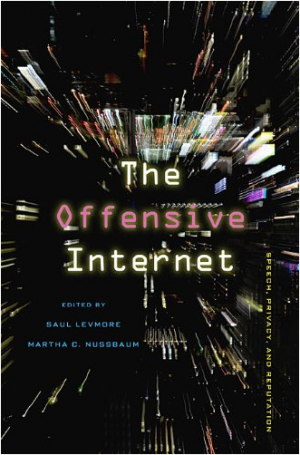The Offensive Internet: Speech, Privacy, and Reputation

The Offensive Internet is a collection of essays that focus on abuses made possible by the freedoms provided by the Internet. The essays deal with the issues of privacy, free speech, cyber-bullying, misogyny, and anonymity. Each essay focuses on one issue to discuss and concludes with what can and cannot be done legally at this time to solve a particular Internet issue.
The book is broken into four parts and each of these parts is comprised of multiple essays on a specific topic. The first is titled “The Internet and Its Problems” and features essays that explore how anonymity on the Internet has lead to widespread cyber-bullying and civil rights abuse. These essays focus on the objectification and abuse women suffer due to these issues (according to one study cited, between the years 2000 and 2007, 72.5% of cyber-harassment victims were women) and what effect this has not only on the victims of these abuses but on society as well. While the authors of these essays are mainly concerned with women's rights, they do also acknowledge that other minority groups (homosexuals, racial minorities, religious minorities) are often targeted by cyber-mobs, signaling a violation of civil rights all around. The real life examples of harassment and slander that these authors reference are disturbing and appalling, and as a reader, one begins to wonder why there are not more laws to regulate and punish cyber-harassment.
The second section of the book is “Reputation.” As the title suggests, these essays deal with how people's reputations can be damaged by the Internet through social networks, Googling, and rumor spreading. These essays address not only the issues we are having currently (for example, people getting fired for things they post on a Facebook page), but also how these issues will shape our society in the future.
The third section, “Speech,” is probably the one topic that is the most controversial. It deals with free speech, a topic that is as debated in the real world as it is in the cyber one. How much free speech should there be on the Internet? What constitutes as free speech and what is slander? Should people be allowed to use foul language or should some censoring be done? And if there is censoring done, who should be responsible for it? These questions and more are posed and discussed throughout the three well thought out essays on speech.
The last section, “Privacy,” concentrated on what information should be considered private, how that privacy should be protected, and what effect the Internet is having on our social norms in terms of privacy. I found the essay on social networks to be the most interesting. The fact that many people consider the information they post onto a social network page to be private, despite being displayed on the very public Internet, is an intriguing phenomenon in our society and this section explores the reasoning and consequences of this train of thought.
While I found many of the topics and issues discussed in this collection to be fascinating and intellectually stimulating, my favorite thing about it was that it didn't so much offer answers as questions that society needs to be asking. Whether you agree with the opinions expressed in it or not, this a book that makes you think, making it a worthwhile read for anyone.